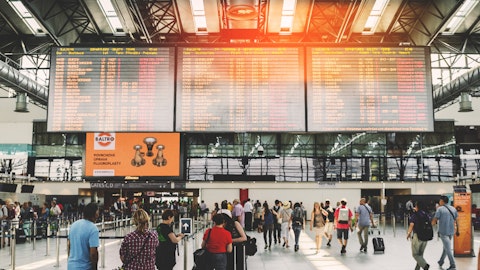Andrew Nocella: Well, it’s hard to follow that. I mean, on the tactics, the one that I would bring up at a very high level would be, we went into the quarter not trying to maximize aircraft utilization, particularly in seasonally Q1, which is weaker. We went in trying to maximize our profitability and I think it works. And I’m really proud of the team for all the changes we made across the network because I think they’re incredibly effective.
Operator: Your next question comes from the line of Conor Cunningham from Melius Research.
Conor Cunningham: Just going back to the comment on you taking advantage of the number of opportunities in the US domestic market. Can you just maybe elaborate a little bit more on that? You talked a little bit about Florida and Las Vegas. Is there any learnings that you have that you go into peak season or is it more of just a shoulder comment as you kind of take advantage of some of the other issues that some of the other carriers are dealing with in general?
Andrew Nocella: Well, as Scott said, the United Next vision here goes across all quarters. But in Q1, we definitely did see a lot of opportunity to continue to take advantage of things that were in our control. And within our control is the ability to continue to pivot the airline to more sunshine type markets like Florida and the Caribbean, and we did so, I think, with great success. In Las Vegas, we put in that category as well that our capacity deployed there was incredibly effective. The other thing is we knew off-peak periods in Q1, it’s not a time to max by utilization. And we took this opportunity to reschedule the airline to make sure that we were not offering unproductive capacity, and I think that worked very effectively.
Below all that or above all that, how you look at it, was just the core building of connectivity across our hubs. It’s working exactly as we intended to do. We still have ways to go on this front. It will be 2026 or 2027 before the connectivity reaches, I think, our desired levels. And so we’re pretty bullish on our ability to continue to outpace domestic RASM growth offered up by or competitors.
Conor Cunningham: Maybe actually sticking with that specifically. I get the fact that you and Delta have distanced yourself from some of your competitors, and that’s pretty obvious at this point, I think. And just — but your performance relative to Delta sticks out pretty meaningfully. And I was just — maybe you could just elaborate a little bit more on what’s uniquely United, because when I think about it, I think that you have a more — a bigger opportunity on premium. You talk a lot about upgauging, but a lot of that has to do with fleet delivery. So I’m just trying to understand on how you kind of close the gap or continue to separate yourself, I should say, from the peers this year?
Andrew Nocella: We continue to drive the United Next strategy. And you’re absolutely correct, the aircraft that we’ll take delivery of come with a lot more premium seat options. Our premium mix this year is up 1.1 points year-over-year in terms of revenue, which is, I think, a very significant change in a very short period of time. And we are going to continue to push that, but we’re also going to continue to push Basic Economy. So our premium mix is up, while our Basic Economy is up and that’s exactly the kind of the recipe we’re looking for in our diversified revenue streams. And briefly on the global network, it’s second to none. It’s number one across the Atlantic and number one across the Pacific. And the changes we’ve made have just been, I think, pretty productive and efficient and accretive, and there’s actually quite a bit of more of that to come.
So I don’t know if that exactly answers your question. But the outlook, I think, is very bright. The premium revenue strategy is working incredibly effectively and we’re going to continue to push it and we think there’s more room to close that gap.
Operator: Your next question comes from the line of Jamie Baker from JPMorgan.
Jamie Baker: First one, probably for Andrew. So I’ve been following this Polaris press for champagne topic on social media. And I’ll admit, in all seriousness, as an analyst, I’m intrigued by the notion of potentially unbundling the forward cabin. The evolution in economy is well chronicled at this point, but we haven’t seen much change upfront. You had the — the passenger that books last pays the most, but has the same experience as the passenger of the books early and pay the least, the way it used to be in economy. Is this something I should even be thinking about or is it a waste of my time?
Andrew Nocella: I won’t dictate how you use your time, Jamie. But…
Scott Kirby: I heard they delete TikTok…
Jamie Baker: Well, that wasn’t the point…
Andrew Nocella: What I would say is we continue to believe that there’s ways to further diversify our revenue streams and segment them. And we continue to believe that there is more opportunity for premium products that we don’t have on board the aircraft today. And those incremental premium products, I’m not going to announce it today, but I can tell you, you have many teams of people work on how to further innovate and provide more and more choice and to monetize that choice on our behalf, obviously, in the future. So I think that headline was just a hint more to come and a lot of people working hard at United to make sure that we can differentiate ourselves not only from our US competitors, but many of our competitors around the globe.
Jamie Baker: And then second, and whoever wants to take this, but when you initially introduced United Next and its growth plan, aircraft were being delivered on time, the discount model wasn’t impaired domestically. So it was pretty easy for us to map out how your capacity share would ramp over time. Obviously, everything has changed since that. My question is on a relative basis to the US industry, so considering these constraints on capacity. Does the new fleet plan keep your relative position on track with the United Next plan? It actually seems to me like you might be somewhat ahead of the plan on market share, but there are quite a few OA assumptions that I have to make there.





